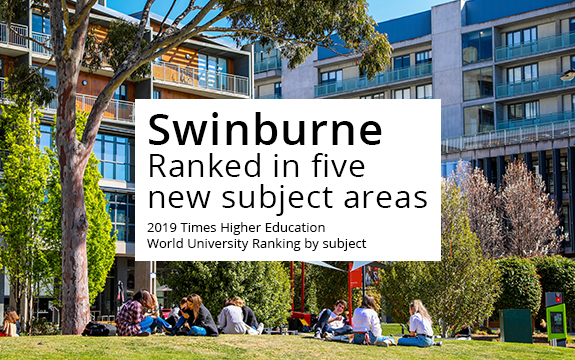Swinburne has debuted in five new subjects in the prestigious Times Higher Education World University Rankings 2019 by subject.
Of the nine subjects Swinburne featured in overall, the five areas in which the university placed for the first time in the world university rankings scheme are:
- Education: 176-200
- Psychology: 251-300
- Business and Economics: 401-500
- Pre-clinical, Clinical and Health: 401-500
- Computer science: 301-400
Deputy Vice-Chancellor (Research and Development), Professor Aleksandar Subic, says this well-earned result demonstrates the university’s outstanding efforts to conduct internationally impactful research.
“Recognition of these subjects as world-class by Times Higher Education is a major milestone for these disciplines and demonstrates our systematic growth in research capacity, excellence and reputation across Swinburne,” Professor Subic says.
Physical sciences, engineering and technology, arts and humanities and social sciences have all been ranked highly again.
Swinburne research highlights
Swinburne’s world-leading and internationally recognised research is reflected in recent initiatives which include:
- A first-of-its-kind partnership with CSIRO in Silicon Valley to increase Australia-US research, innovation and commercialisation
- The creation of a blockchain technology platform to revolutionise the global art trade industry in partnership with ArtChain Global
- The development of a world-first, self-fitting hearing aid with rechargeable battery and the ability to be set via a smartphone
- The launch of Swinburne’s Innovation Precinct, a central point connecting the university’s research and innovation capabilities and providing a place for staff and students to collaborate with industry
Times Higher Education subject rankings methodology
The Times Higher Education World University Rankings judge research-intensive universities across all their core missions: teaching, research, knowledge transfer and international outlook.
The rankings use 13 carefully calibrated performance indicators grouped into five areas:
- teaching (the learning environment)
- research (volume, income and reputation)
- citations (research influence)
- international outlook (staff, students and research)
- industry income (knowledge transfer)
Professor Subic says the university will continue its commitment to fostering a research-led innovation ecosystem based on interdisciplinary research collaboration.
“We have so much to be proud of at Swinburne, as we continue to see our students and staff translating innovative research outcomes into new technologies, products and services that will generate social and economic impact.”


